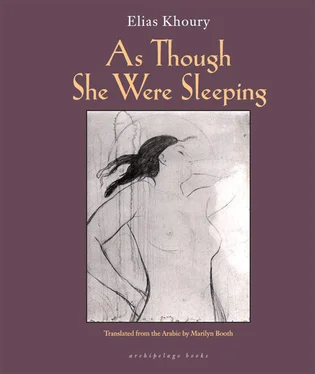Girl, what are you talking about! Remember, like I told you, death is a dream. A person stays where he is and journeys at the same time, and comes back only after traveling to the light.
But why did they kill him, Grandmama?
No one killed him, dear. Don’t believe what your grandpapa says. He went senile from crying so much. It was his grief that invented this story about the sons of Zurayq hanging the boy on the bell rope. No, the poor boy died of fright. Nothing brings death more than being afraid of death. Your grandpapa is old and feeble. When I married him he was twenty years older than me, and now, look, he seems forty years older, maybe even more, God give me patience with him! I told him not to tell this story to the children but when a person gets old he returns to what he was like as a child and he doesn’t know how to talk to anyone but children. Forget the story, my girl. The real story isn’t Mitri’s, it’s mine. I was the stupid one. I don’t know how I ever agreed to marry a widow.
Malakeh’s marriage was a great surprise: a girl of twenty marrying a widower who had already passed his fortieth birthday. Was it his wealth? True, the story that had imprinted itself in Milia’s memory took place when Nakhleh and his only son were working as porters in Beirut harbor. But Nakhleh was not originally a porter and he would not die in poverty. That was the barren patch, as he called that period of time, when the silkworms went as ugly as common worms. Lebanon in the last years of the nineteenth century saw the beginnings of the famine that would devour it during World War I, laying ruin to a third of its population while emigration swallowed up the rest and only those who had no way to leave remained.
Nakhleh had no way to leave and found himself unable to make a living. Sometime around 1890 the man decided to shut his silk goods shop in Abd el-Malik Street, roll up the sleeves of his qumbaz, and get to work. That was how he and his son ended up at the port of Beirut. The truth is that it was Mitri who was the porter; his father simply organized and oversaw his son’s labor. But things improved. Nakhleh said it was Khawaja Efthymios who paid off his debts and thus he saw his way clear to reopening his little shop — but only after it was too late.
It was too late because Mitri died of hanging, and a lifetime was lost because the man did not dare to demand revenge for his slain son. From that moment — the instant of Mitri’s death and discovery — the household was turned completely upside down and Malakeh took over everything.
Why did Milia tell Mansour this story? Was she trying to convince him not to go to Jaffa or was she trying to find a relationship between her grandfather Salim and his Egyptian lover and the dream of her aunt that changed her life? Milia heard the name Efthymios one time only on the tongue of her grandmama. Malakeh was talking with her daughter Saadeh and said something about the moment of release when Efthymios paid Nakhleh. Saadeh asked, Efthymios the very same? Seems Mr. Sergios shows up wherever we are. That sentence stuck in the girl’s mind; and now here it was again intermingling with the sound of the bell.
She wanted to say, None of this has anything to do with me. She wanted to say that she was her own person: I am me; I am not my grandmama nor my great-great-grandmama, Lord, how different people become mixed up inside me. I don’t know who I am anymore.
He was like that, too, said Tanyous the monk. As he went to the cross he did not feel that he was himself. He felt everyone becoming a part of him. He tried to keep his memories apart but he saw everything together. He became mother and father, the Sitt and the Sayyid, Lady and Lord and lamb. Because he was everything, he could say nothing. If he could have talked, what would he have said? And if he did have things to say, who would have understood him? And if he found someone who did understand, who would believe?
Milia was walking on the road that led down to the Virgin’s Wellspring when she heard these words. She sensed the sky opening before her and she had an inkling that she was here to protect Mitri from death. She gave the boy the name Mitri in her mind. No, the truth was that the first name that came into her mind was Issa. She wanted to name the boy Issa, the Messiah’s name in Arabic. As a sign and a good omen, she wanted to be called Umm el-Nur, Mother of Light, as the Virgin had been called. But she did not dare announce that, even quietly to her husband. So she named him Mitri out of fear for him. She wanted to protect him from the bell and prevent the sons of Zurayq from slaying him. But her heart filled with fear because his father would take him to Jaffa, and there he would find only war and death waiting for him. She was not afraid of childbirth as her husband believed. She was certain she could lean against the trunk of a palm tree and give birth if need be; she would not even need Sister Milana there to raise the baby and imprint his image on the stark white hospital wall, as the nun had raised her high in the liwan of the old Beirut house.
Mansour said his name would be Amin. Suddenly the boy had a different name and Milia felt alone in the world. She was accustomed to talking with him, addressing him by one of his two names. There was the public one which, after a great deal of debate, had been settled on as Ilyas — for this would be auspicious, to name him after the Prophet Ilyas the Ever-Living whose secret Milia had come to know from her visit to him in Maarrat Sidnaya near Damascus where she slept in his grotto and felt the savor of eternity blending with the fragrance of the nectar of local wild figs that she had eaten. And there was his secret name, Mitri, for the sake of her only uncle, whom she had never met except in her dreams. The two names were felled in a single blow when Amin died in Jaffa. In her seventh month of pregnancy she had to get accustomed to a new name and a new child.
When Mansour informed her of the new name, she told him it was out of the question. No one changes a baby’s name, she said. It’s a very bad omen. His name was Ilyas, she said, and cried. But Mansour paid no attention to her weeping.
What had happened, and how had this come to be? Normally, when he saw his wife cry, Mansour tried to move heaven and earth. He would beg her not to cry and would reassure her hastily, saying whatever you want or as you like . He would bend over her wet face and blot her tears one by one with his fingertips. He would calm her with the poetry that ran from his lips like water, putting balsam on her wounds. But Mansour had changed. He had become another man, a stranger. She wanted to tell him that she no longer knew him. But she didn’t. Or rather, she did tell him and then she regretted it.
That was the only occasion on which she was sorry to have had a particular dream. Usually she took dreams as they were, for a dream was like fate. Never had she debated her dreams, for they were her windows onto her deepest self: gateways to her spirit and to the souls of others. She dreamed and lived. That is the way she put it to him when he showed how astonishing he found her tendency to speak the language of dreams.
Don’t believe your dreams, he said to her.
If I don’t believe them, who will I believe?
Believe me.
You, yes of course — but the dreams tell me what will happen.
Dreams are just illusions.
And the poetry you’re always chanting to me — isn’t that a fistful of illusions?
Poetry is something real and true. The tempo of the words, the music of the meanings — they give sense to things. Do you remember how I spent my time traveling on your account? I would recall a line from one of Ibn Abd Rabbih’s poems and I would tell myself, This is me. Listen, Milia.
Читать дальше












